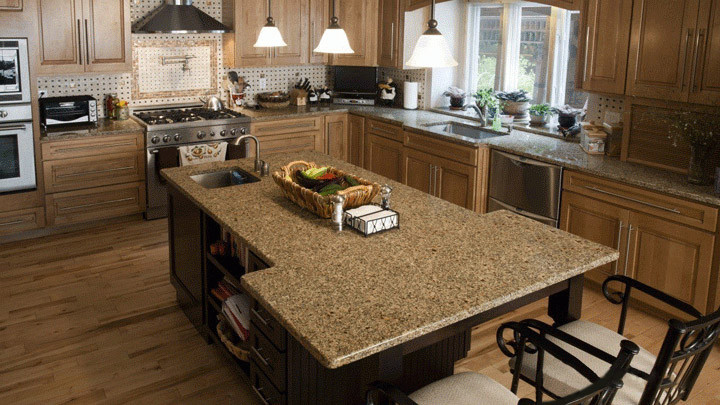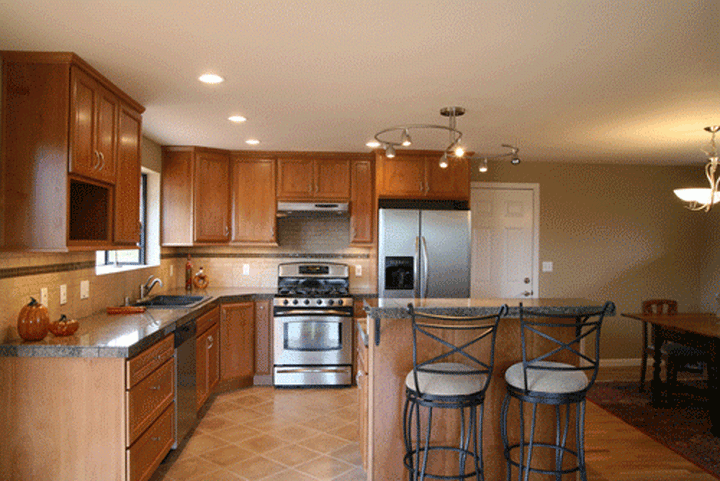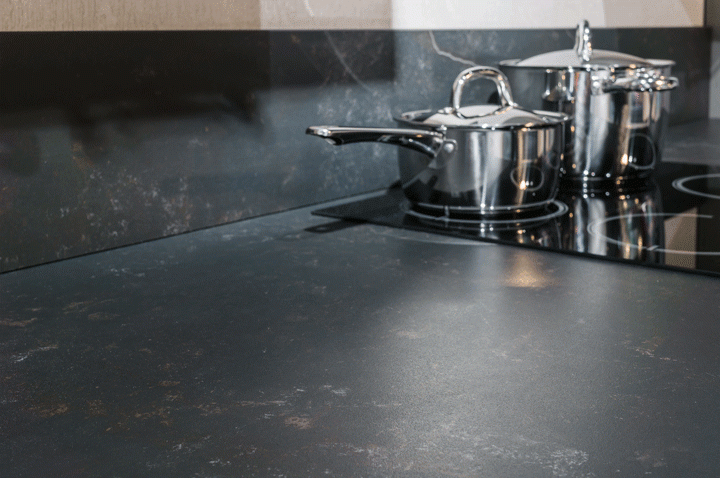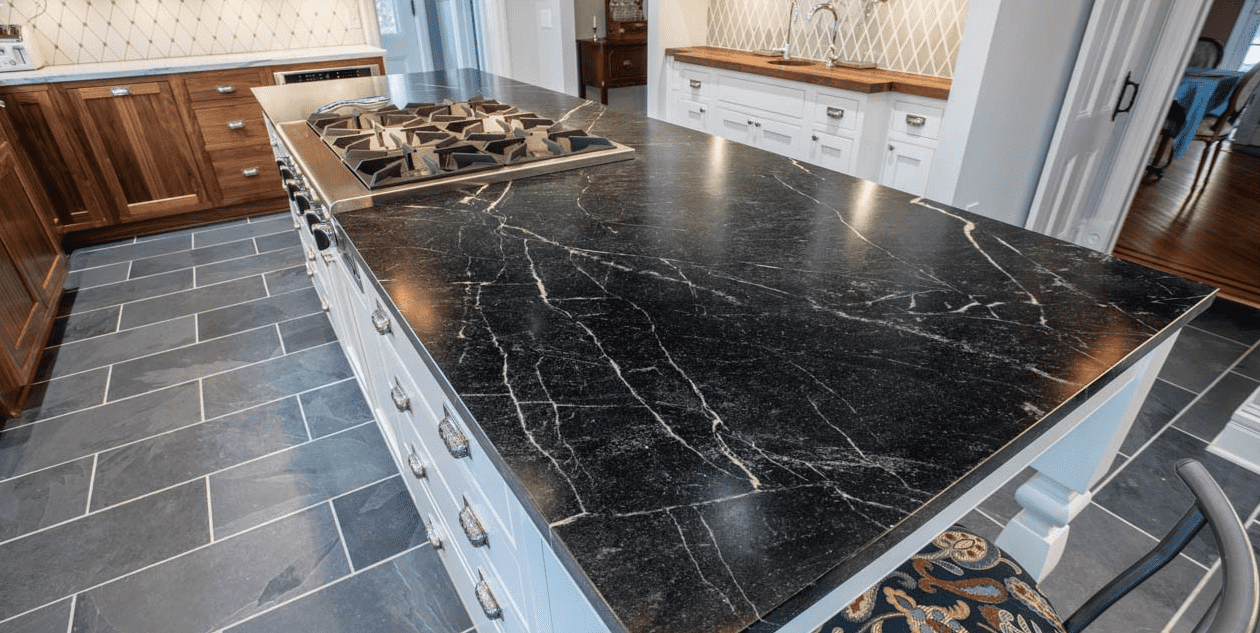
Table of Contents
Natural stone countertop materials are among the most desirable on the market. In particular, granite countertops are a popular presence in many of today’s homes. Whether used for kitchen countertops, bathroom vanity tops, backsplashes or even outdoor countertops, granite is one of the best materials you can find.
That said, you should always carefully think through purchasing a large addition to your home like a countertop. This guide will help you sort out the pros and cons of granite countertops, backsplashes and other surfaces.
[get_quote]
What Are the Pros and Cons of Granite Countertops?
When it comes to stone countertops, there are few materials that can come close to the overall quality you will receive from granite. The following sections will walk through the pros and cons of the material.
Pros of Granite
Appearance
If you are looking to make a bold statement in your home, there are few materials that can help you accomplish that better than a granite slab can. Between the wide range of colors you will find and the different veining options available, you will surely find something that will look terrific in your space. In addition, while other materials may also look nice, there is nothing quite like the natural beauty you can receive with granite.
Variety of Options to Choose From
Another benefit of granite is that you will not be limited in your selection. Granite will provide you with the most extensive amount of options for countertops.
Durable
Granite is a very durable material. In fact, it is one of the most durable materials you can install in your home. As long as you properly care for the surface, which is not difficult to do, your granite will look as good as new years down the road.
Heat Resistant
Granite is a heat resistant material. Unlike with quartz countertops, you can place hot pots and hot pans on a granite countertop without damaging the surface. But while this is possible, it is surely not recommended. Heat resistance makes granite the perfect material for kitchen countertops.
Stain Resistant
Granite countertops are also resistant to stains. While not stain proof, having a properly sealed granite countertop can help the surface stay in great shape for years on end.
Scratch Resistant
Granite is also resistant to scratches, another benefit that is particularly helpful in the kitchen. Using knives on the surface will not damage your granite, although just like the hot pots and pans, this practice is not recommended.
Easy to Seal
Although granite does require sealing, the process is not complicated in any way and will not take long to complete. In addition, while granite is a porous material, it is not as porous as most other natural stones, meaning it will require re-sealing less often. For example, a marble countertop generally needs to be re-sealed every few months, while a granite countertop likely only needs to be re-sealed once per year.
Easy to Repair
It is rare that granite becomes damaged, but if it does, you do not need to panic. There are many simple repair kits, like this one, that you can use to fix the issue. If you have a significant problem on your hands, you should contact a professional.
Cost
Surfaces such as ceramic tile and laminate countertops do cost less than granite. On that note, you will be sacrificing quality to save a little bit of money with options like those. Also, granite is the least expensive of stone countertop options. When you consider that your granite countertop can remain in your home for longer than you do, it is clear that you should invest in the higher quality material. On average, granite costs between $35 to $75 per square foot.
Resale Value
Choosing to complete your remodel by installing a slab of granite as a new countertop or backsplash can have benefits beyond just the aesthetic and functional ones mentioned above. Granite surfaces can often raise the overall value of your home, as the material is highly desirable for home buyers.
[get_quote]
Cons of Granite
Cost
Yes, cost can be a positive aspect of granite. But it can also be a negative if you are looking at high-end types of the natural stone. If you are on a bit of a tight budget, it is recommended that you choose a more common type of granite and opt for standard edging.
Porosity
You will have to re-apply a sealant roughly once per year with granite. While there are some surfaces that you do not have to re-seal, this process is not much of an inconvenience.
Seams
Seams are inevitable on most countertops. It is rare that a countertop will require only one slab, so there will be a seam where the two slabs connect. However, there is no cause for alarm, as many fabricators can often place the seams in inconspicuous places. In addition, if you choose a darker colored granite, the seams will be nearly impossible to spot.
| Pros | Cons |
|---|---|
| Appearance | Cost |
| Variety of options to choose from | Porosity |
| Durable | Seams |
| Heat resistant | |
| Stain resistant | |
| Scratch resistant | |
| Easy to seal | |
| Easy to repair | |
| Cost | |
| Resale value |
What Else Should You Know About Granite?
As you should with any other countertop material, carefully evaluate the pros and cons of granite, as well as other information that could impact your decision. Below is some helpful information for you to know when considering granite.
How Does the Cost of Granite Compare to Other Countertop Materials?
The table below compares the average cost of granite to that of many other countertop materials.
| Ceramic Tile | Between $5 to $7 per square foot |
| Laminate | Between $20 to $50 per square foot |
| Granite | Between $32 to $75 per square foot |
| Butcher Block | Between $35 to $200 per square foot |
| Marble | Between $40 to $100 per square foot |
| Travertine | Between $45 to $75 per square foot |
| Glass | Between $50 to $70 per square foot |
| Quartz | Between $50 to $120 per square foot |
| Recycled Glass | Between $50 to $125 per square foot |
| Slate | Between $50 to $200 per square foot |
| Soapstone | Between $55 to $100 per square foot |
| Quartzite | Between $60 to $120 per square foot |
| Concrete | Between $70 to $150 per square foot |
| Limestone | Between $70 to $200 per square foot |
| Solid Surface | Between $75 to $120 per square foot |
| Stainless Steel | Between $75 to $150 per square foot |
| Onyx | Between $75 to $250 per square foot |
| Gemstone | Start around $100 per square foot |
How Do You Re-Seal Granite?
As mentioned above, re-sealing granite is a very quick and simple process. The steps for the process are outlined below.
Step 1: Choose Your Desired Sealer
The sealing process begins by choosing an ideal sealer for your granite. There are many great products for sealing granite such as Laticrete StoneTech BulletProof Sealer. Another great product you can use is this one, which comes in an easy-to-use spray bottle.
Step 2: Clear Off and Clean Your Granite
Take all the items off your countertop and give it a good cleaning. Make sure to use a granite cleaner, not just soap and water.
Step 3: Apply the Sealer
Apply the sealer by either spreading it on with a brush or spraying it on if it comes in a spray bottle.
Step 4: Wait for 15 Minutes
After you apply the sealer, wait for 15 minutes. If you notice that all the sealer has absorbed during this time, you will need to apply an additional coat.
Step 5: Wipe Off Any Excess Sealer
Once you have waited the appropriate amount of time, you can wipe off any excess sealer.
Step 6: Let the Surface Sit for At Least 24 Hours
Let your granite sit without use for at least 24 hours so the sealer can take effect. After this, your granite is properly sealed and will likely not require another coat for about a year.
| Step 1 | Choose your desired sealer |
| Step 2 | Clear off and clean your granite |
| Step 3 | Apply the sealer |
| Step 4 | Wait for 15 minutes |
| Step 5 | Wipe off any excess sealer |
| Step 6 | Let the surface sit for at least 24 hours |
How Do You Know Your Granite Needs to Be Re-Sealed?
To determine if t is time to re-seal your granite, there is a simple test you can do. Pour a small amount of water on a small section of your granite. If it absorbs within 10 minutes, you need to re-seal your granite immediately. On the other hand, if it beads on the surface, you do not need to re-seal yet.
[get_quote]
Can You Install Granite Countertops on Your Own?
Granite is a very heavy material that is complicated to work with. Because of this, you will need to hire an installer to put your new granite countertop or backsplash in. Professional installation will significantly lower the risk of an improper installation and will prevent you from being injured attempting to install on your own.
Whether it’s a granite kitchen, granite bathroom or you incorporate the stone in other rooms of your home, it is no wonder that granite is such a popular choice among homeowners. Through reviewing this guide, you can make an informed decision when the time comes to buy.
















 The article helped me immensely
The article helped me immensely
 I’m now more informed on the subject
I’m now more informed on the subject
 I have questions about Marble.com
I have questions about Marble.com
 The article was not accurate at all
The article was not accurate at all
 There is a serious lack of information
There is a serious lack of information
 I have questions about Marble.com
I have questions about Marble.com